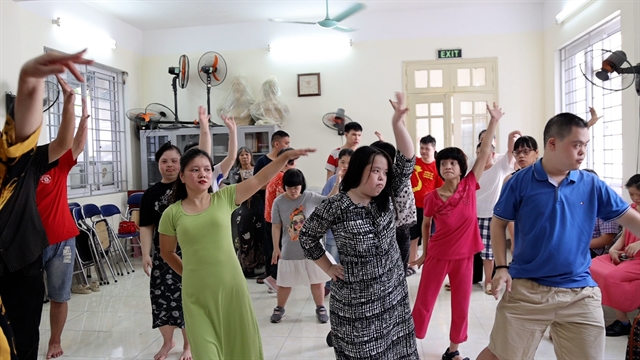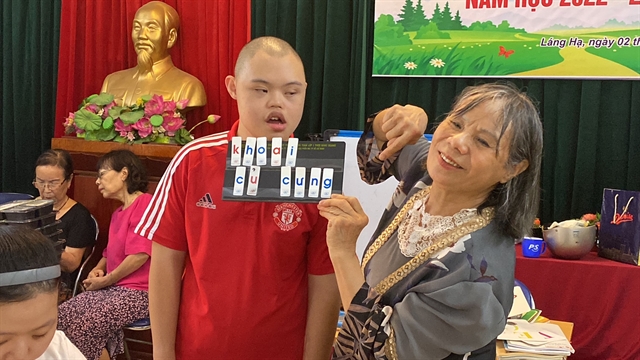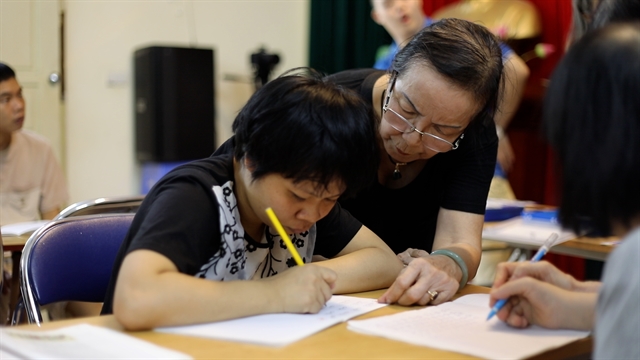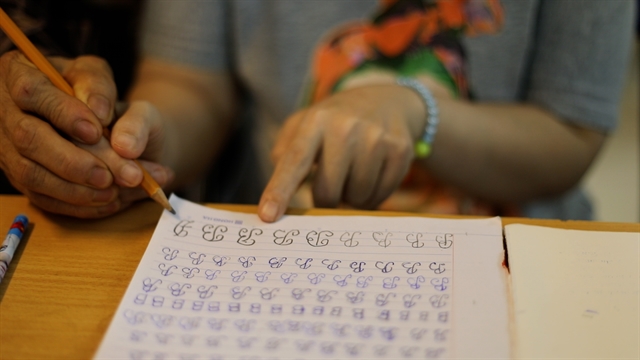Weather:
- Ha Noi 33oC
- Da Nang 30oC
- Ho Chi Minh 33oC
By Lê Hương
It is a bright Sunday afternoon, and the room for common activities in Building X10 in Nam Thành Công living quarter in Hà Nội, is crowded as usual with 30 children, most with Down's syndrome, autism and other mental disabilities.
The children’s dances and songs to the rhythm of an electronic keyboard echo throughout the otherwise quiet lane.
Children lose themselves in the dancing. Some stagger slightly, but they soon catch up with the music's rhythm.
In a corner of the room, Vũ Thị Xuân joins the dance with her son. She sometimes holds his hands to imitate others’ movements. Xuân’s 16-year-old son tries to follow others, his face lit up with a bright smile.
Every Sunday for the past 11 years, Xuân has brought her son and stayed with him here all day to join in the activities of the Hà Nội Club for Disabled Children.
“He has Down's syndrome,” she tells Việt Nam News in tears. “He cannot do anything himself. Everything, right down to basic personal hygiene matters, I have to do for him."
Nam’s grandfather fought in the anti-American war and suffered from Agent Orange. He then gave birth to five healthy children, who then grew up and got married and gave birth to four children with Down's syndrome.

“My son is luckier than his cousins in the rural areas,” Xuân says. “His cousins have to be locked at home when their parents go to work.”
Xuân says Nam had changed a lot since he joined the club at six. When he heard people singing, he smiled. At home, when he got bad-tempered, she mumbled a song, and he seemed to feel peaceful again.
“There are various activities at the club. I have seen other children here learn very well. My son is much slower; he cannot remember much in Vietnamese spelling lessons and English lessons. But since joining the club, he’s always happy. That’s enough for me.”
For the past 28 years, the club has been a favourite destination for children like Nam.
Here, they can learn singing, dancing, spelling basic Vietnamese and English, and even some handicrafts like making paper flowers.
“I’m a professional artist,” says Phan Thị Phúc, the club founder. “Before I retired, I was responsible for children’s repertoire at the Youth Theatre. I found out that a group of underprivileged children, including children working as newspaper sellers, shoe shine boys, and disabled children, did not have any special art programme.”
“During my career, I met many such children loving arts and asked me to come to the shows to see them for free. I and other volunteer teachers have helped children to believe in equality and ensure that they are not left behind.”
Phúc says that of her first-generation club of hearing-impaired children, 18 got married and gave birth to normal children without impaired hearing.
“Many of our students have also had grandchildren already,” she says. “I just think our caring and sharing have created belief. I believe in my work. And when I believe, I am determined.”
For the past 28 years, Phúc has been joined by enthusiastic volunteer teachers to enrich the souls of hundreds of underprivileged children.
Volunteer teacher Trần Đăng Quang, an 11th grade student says, “I want to teach them as I would like to have more contact with disabled children in a friendly environment. I also want to teach them some basic English so that they can communicate in English when foreign visitors or reporters come to the club.”

Quang says he teaches the same lesson many times. Gradually, they can remember almost all the words he has taught.
“I hope they can have fun at the club and at home. Through my volunteering work here, I want to have more experience working in a new environment to support needy people. It brings no money, but I gain love and understanding,” Quang says.
Nguyễn Thị Thanh Hồng, a dance teacher, admits that at first, she found it difficult to communicate with the disabled.
“Their living environment was inside with their families only,” she says. “I teach them dancing, which requires many body movements. Gradually, they like it and are waiting for the lesson when I’m late or have to be off from the club.
“I often have vestibular balance disorder, but as soon as I get a medical infusion, I rush to the club even with a bandage on my arm. They will hug me tenderly when they see me, which moves me a lot. However busy I am, I still fix my schedule to teach them on Sunday,” she says.
Hồng says that over time, the children gain a much sharper ear for music.
“Their movements have become more artistic,” she says. “They put their soul into the songs and dancing. They have got much more interested in the art.”
Some children have engaged for a long time with the club and even assisted the teachers in return.

“I worked as a domestic helper for my family,” says Nguyễn Minh Hồng, a 30-year-old woman with memory difficulties. “I take the bus to the club every Sunday. I am delighted here with Mum Phúc and the other teachers and other club members.”
She also helps Phúc run the class. “If there are any children misbehaving, I comfort them to concentrate on the lessons again,” she says.
Nguyễn Nhật Lệ, a 26-year-old girl with Down's syndrome, who has joined the club for 20 years, says: “I come to the club whatever the weather as I like it. I love Mum Phúc and all the teachers.”
Phúc says that now she just wishes to have more strength to continue her work with the club.

“My work has actually bought happiness for students and their families as well as gained praise from the whole of society,” she says.
All the teachers and club members wish to have permanent premises where they can practise and perform, so as not to borrow from local authorities or schools.
“I hope they will never forget art,” says dance teacher Thanh Hồng. “Whether it is I, or any other teacher that teaches them, they should learn art to develop themselves and understand goodness and beauty.”
Parent Xuân says she profoundly hopes that the club will keep going forever.
“Phúc’s club is so good, it should be maintained for a long time,” she says. “Now my son is grown up, I tell him on Sunday morning: be quick to get to Mum Phúc’s club. He gets up very quickly and in joy. I think this club model should be maintained and multiplied.” VNS



